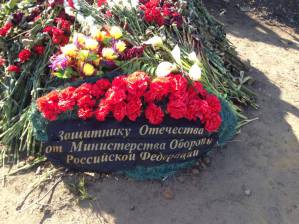Russia’s Supreme Court allows Putin to hide Russian military losses in Ukraine
 The grave of a Russian soldier killed in Ukraine (photo: Ruslan Lebiev)
The grave of a Russian soldier killed in Ukraine (photo: Ruslan Lebiev)
Russian President Vladimir Putin’s decree classifying information about military losses in peacetime as ‘state secret’ is legal, the Supreme Court has ruled. It is unclear how the Court dealt with the compelling arguments presented against this view, but the result was unfortunately predictable. Putin’s decree is widely seen as linked with Russia’s undeclared military engagement in Ukraine and can be used as a weapon against those trying to provide truthful information about the conflict, including details of Russian soldiers killed in the fighting. It is no accident that the nine Russians who challenged the decree include Lev Schlosberg who first revealed details of the death in Ukraine of Pskov paratroopers; Svetlana Davydova, a mother of 7 arrested earlier this year on charges of ‘state treason’ for informing the Ukrainian embassy about Russian soldiers being sent to Donbas and a number of independent journalists reporting on the conflict.
Human rights lawyer Ivan Pavlov explains that their struggle is far from over, and that the ruling gives them grounds to apply to the Constitutional Court and force a proper assessment of how information in Russia is classified as state secret.
Putin’s decree of May 28 classifies information about Russian military losses during “special operations in peacetime”, without providing any definition of ‘special operations nor any clarity as to what information is to be concealed Are only statistics about losses to be classified, for example, or any details of soldiers killed? Experience up till now unfortunately suggests the latter, with heavy pressure reported on families to keep silent about deaths, as well as attacks and prosecutions of human rights activists revealing such information.
The nine applicants argued that:
Putin (and before him President Boris Yeltsin), had exceeded his powers by classifying information about military losses. Russia’s Constitution clearly states that the constitutional right to freely seek, receive and circulate information can only be restricted by federal law.
Yeltsin’s 1995 decree classified such information in wartime and Russia had not since then officially been war. It was Putin’s decree which made the situation urgent since it enables the state to classify information about undeclared warfare concealed through the vague term ‘special operations’.
Article 5 of Russia’s Law on State Secrets gives a comprehensive list of the information which may be classified, including many aspects of military action, but with no mention of military losses.
The Law on State Secrets does not give the President the power to extend the range of state secrets, and a decree is not a law. The Law stipulates only that the President should, on the basis of Article 5, approve a List of information deemed to be state secret.
Information about emergency situations cannot be classified at all. According to Article 7 of the Law on State Secrets, “information about exceptional occurrences and catastrophes, jeopardizing citizens’ safety and health, and their consequences” may not be classified.
The move to have losses during ‘special operations’ classified as state secret was apparently initiated by Russia’s FSB [Security Service]; Military Intelligence Service and the Defence Ministry, with the relevant proposal being submitted by Prime Minister Dmitry Medvedev. This information was presented by Putin’s representative in court, Natalya Yelina, who asserted that Putin had merely affirmed a list provided by the government. She also apparently rejected the suggestion that a ‘special operation’ involving the death of soldiers should be viewed as an ‘exceptional circumstance’.
Putin’s Press Secretary Dmitry Peskov is reported to have stated that in the opinion of these bodies the additional information classified “best complies with the interests of the state.”
This view was not shared by Boris Nemtsov, the opposition politician gunned down near the Kremlin on Feb 27 this year. The information he was gathering, and that has now been made into a report by his associates may well be deemed to fall under Putin’s decree. Schlosberg is reported to have said that if Putin’s decree had been in force 15 years ago, Russians would never have learned of the Kursk submarine disaster. It remains to be seen whether the kind of information revealed by Soldiers Mothers of St. Petersburg, Lev Schlosberg, members of the Presidential Human Rights Councils and others over the last year will now result in charges of state treason. The decree is dangerously, and almost certainly deliberately unclear. What better deterrent in a country where the Supreme Court can seriously uphold the President’s right to conceal information about the deaths of Russian soldiers in Moscow’s undeclared war against Ukraine?





